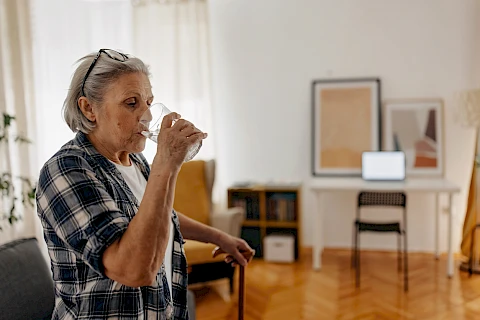
Our bodies face various challenges as we enter our senior years, and maintaining a healthy bladder becomes even more important. Staying hydrated is important for bladder health and can help prevent common bladder problems in older adults. Here, we'll discuss the relationship between hydration and bladder health, and provide practical hydration tips for seniors to maintain a healthy bladder.
The Link Between Hydration and Bladder Health
Hydration is key to keeping the bladder functioning smoothly. When the body is well-hydrated, it can efficiently filter waste and toxins, ensuring the urinary system operates effectively. Not drinking enough water can cause concentrated urine, which irritates the bladder, encourages harmful bacteria, and causes discomfort.
Seniors are more prone to dehydration for various reasons, including changes in body composition, a decreased sense of thirst, and certain medications. Dehydration can lead to bladder issues, such as urinary tract infections (UTIs) and incontinence, making it essential to prioritize proper hydration.
Signs of Dehydration in Seniors
Be vigilant for signs of dehydration, as early detection and intervention can prevent more serious health issues. Common signs of dehydration in seniors include:
- Dry mouth and skin
- Dark yellow or amber-colored urine
- Fatigue or dizziness
- Confusion or irritability
If you notice any of these signs, take action to increase fluid intake and seek medical advice if necessary.
Tips for Staying Properly Hydrated
Dehydration is easily avoided when you practice simple habits. Here's what you can do daily to combat painful and potentially dangerous bladder issues:
Drink Water Throughout the Day
One of the simplest ways to maintain hydration is to drink water consistently throughout the day. Seniors should aim for at least eight 8-ounce glasses of water daily, but this may vary based on individual needs and medical advice. To incorporate more water into daily routines, consider carrying a water bottle throughout the day, setting reminders or alarms to drink water regularly, and drinking a glass of water before each meal.
Eat Water-Rich Foods
Incorporating water-rich foods into your diet is another effective way to stay hydrated. Foods such as cucumbers, watermelon, oranges, and strawberries have high water content and are refreshing additions to meals. A diet full of fruits and vegetables helps keep you hydrated and provides important vitamins and minerals for overall health.
Limit Caffeine and Alcohol
Caffeine and alcohol are diuretics, leading to increased urine production and potential dehydration. It's wise to limit coffee, tea, and alcohol to maintain optimal hydration. Consider replacing these with herbal teas or other decaffeinated options. If you still enjoy your morning coffee or an evening drink, balance them with extra water intake.
Stay Hydrated, Stay Healthy With Senior Helpers
Hydration is a fundamental aspect of maintaining bladder health in seniors. Drinking enough water and eating a balanced diet can help reduce the risk of bladder problems like UTIs and incontinence. Following these hydration tips will boost bladder health and overall wellness.
Do you need help with personal care tasks, meal preparation, light housework, and friendly drop-in companionship? Contact us for tailored in-home senior care services in Lawrenceville, Buford, Auburn, Flowery, and Hoschton. We look forward to meeting you.